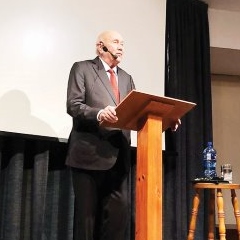
SA

SA in better place 25 years on, says De Klerk
STEVEN GRUZD
De Klerk was speaking about “The New South Africa after 25 years” at the Chief Rabbi Harris Community Centre at the Great Park Synagogue in Johannesburg on Tuesday night, co-hosted by the South African Jewish Board of Deputies.
He was the man who took the courageous steps in 1990 of unbanning the African National Congress, releasing political prisoners, and steering the country towards negotiations. At the time, South Africa faced economic ruin, further political isolation, and the prospect of a protracted racial bloodbath. He said, “Let me be clear. If we had not reached a settlement, as soon as possible after the collapse of the Soviet Union, the balance of forces would have inexorably and quite quickly shifted against us … clinging to power was simply not a rational option.”
De Klerk said that despite crises and disappointments, South Africa was in a far better place 25 years on than if the society had not transformed. South Africa is once again part of the international community, with unhindered trade and travel possible. The middle class has grown and prospered enormously. The constitution is surviving. The courts remain independent, and with the media and civil society, they continue to defend human rights. “Indeed,” De Klerk said, “they played a central role in ensuring the downfall of Jacob Zuma and his state-capture project.”
But he also described South Africa’s serious challenges, including almost 40% unemployment, a failing education system, rampant corruption, and indebted, dysfunctional state-owned entities.
“Most disturbingly,” he said, “South Africa can no longer be regarded as a non-racial society. Instead, under increasingly onerous black-empowerment laws, the prospects of individuals are once again determined, as Martin Luther King put it, ‘not by the content of their character, but by the colour of their skin’. Our government has virtually abandoned the great example of racial reconciliation that was set by Nelson Mandela.
“There is no balance. Foolish and unacceptable racist remarks by white non-entities, not intended for public dissemination, are treated far more harshly than incendiary remarks made intentionally in public by prominent political leaders, only sweeping up animosity and inciting harm.”
He said the Jewish community “is only too well aware of the danger of [negative] racial stereotypes, particularly when they are propagated and fervently believed by government”.
Of the South African Jewish community, he said, “I have enormous respect for the disproportionate support that you so generously give to so many cultural and charitable causes … I believe that minorities everywhere can learn from the manner in which your community resolutely retains its ancient traditions, beliefs, and identity on the one hand, while continuing to play an active and constructive role as citizens in our vibrant multicultural, multi-ethnic, and multifaith country on the other hand.”
“I have always been impressed by the manner in which the Jewish Board of Deputies pounces immediately on anti-Semitic statements or actions, and calls those involved to account. Other communities should follow this example.”
De Klerk said the country would have courted disaster had Cyril Ramaphosa not (narrowly) defeated Nkosazana Dlamini-Zuma in the 2017 ANC leadership battle. He praised some of Ramaphosa’s decisions, such as reforming the National Prosecuting Authority, pledging to implement the long-forgotten National Development Plan, restructuring the boards of state-owned entities, and attracting investment.
But doubts linger. “Expropriation without compensation” abrogates property rights, and the proposed National Health Insurance scheme would bankrupt the country and cause more medical professionals to emigrate. De Klerk called both “fundamental threats”.
He said that it was incumbent on all South Africans to be well informed, and exercise their rights and powers as citizens to raise their objections. They should propose workable and affordable land reform and healthcare reform, and “do the right things and support the right causes. We can’t be spectators – we must act.”
On the Israeli-Palestinian conflict, De Klerk drew the analogy of himself and Nelson Mandela taking bold initiatives, “calculated risks”, that paved the way for meaningful negotiations.
He said, “I’m a believer in the two-nation-states solution. I think, however, that the window of opportunity for that is closing.” He said two basic initiatives were necessary. Israel should offer the Palestinians “a reasonable cut of land, with reasonable borders”, stop building settlements, and seek protection for those who might find themselves living in a future Palestinian state. The Palestinians “should acknowledge, unequivocally, the right of the State of Israel to exist”.




